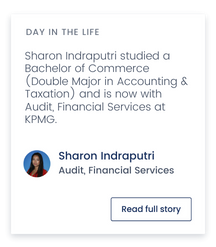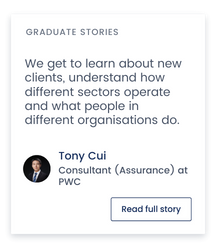5 reasons you should apply for a graduate program
Craig Shepherd
Why apply for a graduate program?
If you’re currently studying or planning to do so, chances are you’ve got some idea of where you want your degree to take you. You’re not doing all this hard work for nothing, right? One of the best ways to get your career started the right way is to apply for a graduate program. If tailored training, the chance to really learn how an organisation works, networking opportunities and clear career progression sounds good to you, that’s because it is. Read on to find out exactly why a graduate program could be the best career move you can make.
Training
The training offered in a graduate program can often far exceed what you’ll receive if you just join an organisation in an entry-level position. There’s a big difference between training and mentoring - with many graduate programs it’s likely you’ll have a mentor as well as take part in ongoing training. The practical training is usually very structured and geared to giving you all of the technical skills required to do your job (or multiple jobs if you’re on rotations), but mentoring is where you’ll get all of the juicy information you won’t get from an employee handbook or training package.
When asked about his experience as a member of Bendigo and Adelaide Bank Group’s graduate program, Ben Wilson had this to say: 'From the beginning of the program I was provided with all the tools and training necessary to achieve my aspirations. On my first day I was provided with a senior leader to be my mentor and to guide me through my journey.'
Each graduate program will vary when it comes to mentoring - like Ben you might have a senior staff member guiding you through, other employers may pair you up with someone who has recently completed the program themselves. Either way, you’re in for a lot of industry and organisation specific knowledge you won’t get anywhere else.
Career progression
Don’t get us wrong, joining an organisation in a lower-level position and hoping to climb through the ranks is totally possible. But if that’s your goal, a graduate program will make it a whole lot easier. While obtaining a graduate position in your field is certainly an achievement, people can often find themselves pigeonholed into one role within an organisation. Alternatively with a graduate program, you aren’t just being developed as an engineer, for example. You’re being developed as a future leader. The training, mentoring, networking opportunities and the chance to rotate through the organisation is all designed to give you the skills and knowledge to succeed at any role you set your sights on. Toyota is just one of many employers who even advertise that they’re seeking people who are driven to become future Toyota leaders.
While participating in a graduate program doesn’t guarantee you’ll be running a department in five years time, it certainly gives you all the tools to get there quicker than you would from outside of the program. When you consider the time and resources an organisation puts into their graduate programs, it stands to reason they want you to be a key part of their business for many years to come.
Take a look at these graduate stories
Networking
If you’ve done an internship during your studies, you should be well aware of the importance of networking. While an internship certainly gives you the chance to build relationships in the office you’re placed in, those opportunities are increased considerably during a graduate program.
The amount of people you can meet and work with during a graduate program is really only limited by your willingness to put yourself out there. You’ll usually have a mentor who at the very least will have been with that employer for a few years, and at best could be a member of senior leadership and graduates often find they have access to executive staff also. Even something as simple as making a good impression during a meeting with high-level staff can be huge for your career.
Remember, a graduate program isn’t just a training course. You’re still employed in your chosen field and expected to perform in that role so every project you work on and every meeting you attend is an opportunity for you to impress the right people.
Work rotations
Many graduate programs, especially those with larger employers, will offer participants the chance to rotate through multiple areas of the organisation. Rotations are usually six months each, however each program may be different.
Jayde Pedley is working as a graduate business analyst with Suncorp and has been able to move teams during her program, even though it is a specialised program rather than a generalised program with structured rotations. Jayde said ‘I decided I wanted to try something different and was fortunate enough to be able to move around into another team.’
On the other hand, Amanda Wu completed a program at Ashurst as a graduate lawyer, completing three rotations in an 18 month program. Highlighting the benefits of these rotations, Amanda says ‘This gives each graduate an opportunity to explore their interests in a few areas of law and develop well-rounded skills prior to settling in a specific area of law at the end of the programme.’
One thing is for certain, regardless of how the rotations are structured in a graduate program - the exposure to different parts of a business not only creates a huge amount of networking opportunities, but it may give you a hands-on look at some career paths you hadn’t even considered before.
Travel opportunities
Everyone loves to travel, right? Whether it’s glamorous trips overseas or domestic travel to see the rest of Australia, travel is pretty high on most people’s list of passions. While a graduate program isn’t going to send you off to sip margaritas on a beach at sunset, there are definitely opportunities to get out of the office during your program.
Depending on the employer, you may find you get the chance to spend some time working in different offices either in Australia or abroad. Sam Bates, who joined UBS as a graduate is now an investment banking analyst. As a graduate he spent a six-week session in London and marked the opportunity to work with overseas colleagues as a highlight of his graduate year.
If overseas travel isn’t your thing and you’re just looking for a change of scenery as you kick-start your career, you can look for graduate programs interstate and get ready to make the big move.
Popular searches
Business & Commerce Graduate Jobs & Programs
Finance Graduate Jobs & Programs
Banking Graduate Jobs & Programs
Consulting Graduate Jobs & Programs
Graduate Jobs & Programs in Melbourne
Graduate Jobs & Programs in Sydney
Graduate Jobs & Programs in Brisbane
Graduate Jobs & Programs in Perth


